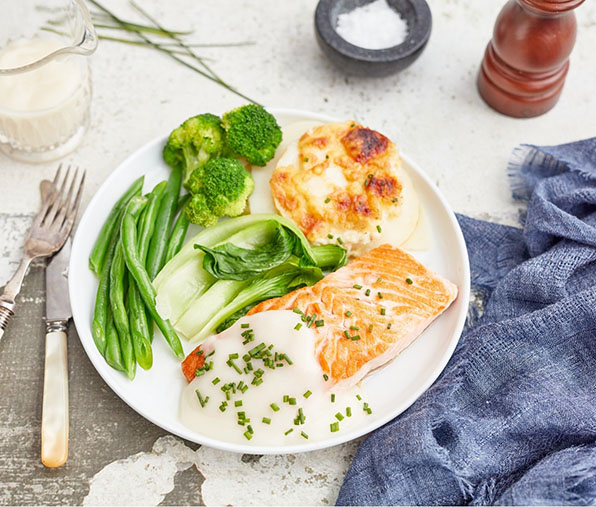
Understanding the nutrition needs of older adults
As our bodies change with age, so do our nutritional requirements. The balance between energy intake and essential nutrients becomes increasingly important for maintaining health, mobility, and independence. Understanding these changing needs is key to supporting healthy ageing and preventing complications from poor nutrition.
Why elderly nutrition is different
Ageing brings several physiological changes that directly impact nutritional needs. While older adults typically require fewer calories due to decreased activity and a slowing metabolism, their bodies simultaneously become less efficient at absorbing and utilising nutrients.
These changes become more pronounced after age 70, when nutrient absorption declines further. Certain medications can also affect nutrient use, particularly B vitamins. As a result, nutrient requirements increase relative to calorie intake.
Research consistently shows that diet quality affects physical strength, cognitive function, bone and eye health, vascular health, and immune system response. Yet achieving proper nutrition can be difficult due to:
- Decreased appetite and taste changes
- Oral health or swallowing difficulties
- Limited mobility impacting shopping and meal preparation
- Financial constraints
Maintaining muscle mass is especially critical. Studies show that older adults with higher protein intake lose significantly less lean muscle mass over time compared to those with low protein diets.
Daily calorie and nutrient requirements
Older adults need fewer calories than younger people but still require nutrient-dense meals. On average:
- Women aged 60+ need 1,600–2,200 calories daily.
- Men aged 60+ need 2,000–2,600 calories daily.
These calories should come mainly from whole foods, with minimal added sugars, refined starches, saturated fats, and sodium.
Key nutrients for older adults:
- Protein: Vital for muscle maintenance. Many over 70s benefit from slightly higher protein intake.
- Calcium & Vitamin D: Critical for bone health. Women need 1,200mg of calcium from age 51, and men from age 71. Vitamin D needs rise to 20mcg (800 IU) after 70.
- Vitamin B12: Absorption declines with age, making supplements or fortified foods valuable.
- Fibre: Essential for gut and heart health, yet underconsumed in older age.
- Hydration: Thirst diminishes with age, making dehydration a common risk. Six or more glasses of water daily are recommended.
What healthy meals look like for older adults
The best meals for older adults are varied, nutrient-dense, and appropriately portioned. A balanced diet should include:
- Protein-rich foods: Lean meats, fish, legumes, eggs, and dairy
- Calcium sources: Low-fat dairy, fortified milks, or canned fish with bones
- Whole grains: Rich in fibre and B vitamins
- Colourful fruits and vegetables: Full of antioxidants, vitamins, and minerals
- Healthy fats: Omega-3 sources such as fatty fish, flaxseeds, and walnuts
At Gourmet Meals, our dietitian-designed menu caters to these needs. Each main meal provides at least 25g of protein and falls within 1200–1800kJ, specifically tailored to support Australians aged 65+ with muscle strength and overall wellbeing.
Risks and signs of malnutrition
Malnutrition affects many older adults, often going undiagnosed. Early signs include:
- Unintentional weight loss (5–10% in 3–6 months)
- Reduced appetite or interest in food
- Constant fatigue or weakness
- Frequent illness and slow recovery
- Low mood, depression, or poor concentration
Malnutrition can occur even in people with normal weight, making nutrient-dense meals essential. Left untreated, it increases fall risk, weakens immunity, and slows healing.
Balanced, ready-made meals, like those from Gourmet Meals, help prevent these risks by ensuring consistent, adequate nutrition.
Hydration and wellbeing
Hydration is often overlooked but vital for older adults. Dehydration can lead to confusion, urinary tract infections, and reduced mobility. Offering varied beverages, soups, fruits, and other high-water foods helps older adults stay hydrated alongside nutritious meals.
Practical strategies for better nutrition
- Meal planning: Three balanced meals daily or smaller frequent meals if appetite is reduced.
- Fortified foods: Add milk powder, cheese, or oils to increase nutrient density.
- Professional guidance: Dietitians can personalise nutrition plans, while speech pathologists support safe eating for those with swallowing difficulties.
- Meal delivery: Services like Gourmet Meals make it easy to access balanced, portion-controlled meals at home.
The social and emotional value of food
Food is more than fuel; it connects us socially and culturally. Eating with others reduces loneliness, while familiar meals provide comfort and reinforce identity. Supporting food preferences, traditions, and cultural practices improves both wellbeing and dignity.
At Gourmet Meals, we believe mealtimes should be enjoyable as well as nutritious, helping older Australians maintain health, independence, and quality of life.
FAQs
Q: How do nutritional needs change as we age?
A: As we age, we need fewer calories but more nutrients like protein, calcium, vitamin D, and vitamin B12. These help offset reduced absorption and age-related muscle loss.
Q: What are the signs of malnutrition in older adults?
A: Unintentional weight loss, low appetite, frequent illness, fatigue, and depression are common signs. Malnutrition can occur even in people with a normal or high BMI.
Q: How can we improve the mealtime experience for older adults?
A: By improving presentation, creating a home-like dining environment, and encouraging autonomy. Colourful foods, proper tableware, and the ability to choose meals improve nutrition and enjoyment.
Q: Why is hydration particularly important for older adults?
A: Hydration reduces fall risk, maintains muscle and immune function, and supports digestion. Because thirst declines with age, offering varied drinks and water-rich foods is key.
Q: How does food contribute to emotional wellbeing in older adults?
A: Food provides comfort, preserves cultural identity, and strengthens social connections. Sharing meals helps combat loneliness and boosts overall happiness.
Tags: Healthy Ageing, Nutrition For Seniors, Easy Meals For Seniors, Eating For Energy, Healthy Lifestyle, Frozen Meals, Easy Meal Delivery, Convenient Meals, Maintaining Mobility






